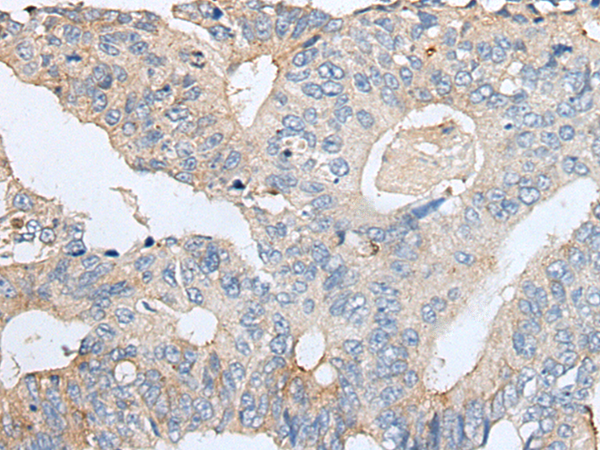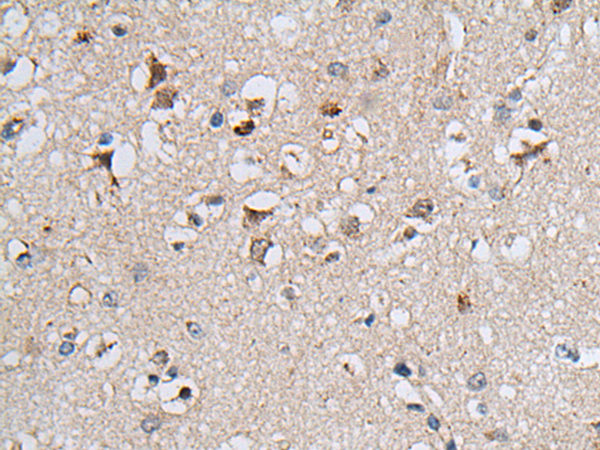

| WB | 咨询技术 | Human,Mouse,Rat |
| IF | 咨询技术 | Human,Mouse,Rat |
| IHC | 1/25-1/100 | Human,Mouse,Rat |
| ICC | 技术咨询 | Human,Mouse,Rat |
| FCM | 咨询技术 | Human,Mouse,Rat |
| Elisa | 1/5000-1/10000 | Human,Mouse,Rat |
| Aliases | ARVD; RNHF; ARVD1; TGF-beta3 |
| Host/Isotype | Rabbit IgG |
| Antibody Type | Primary antibody |
| Storage | Store at 4°C short term. Aliquot and store at -20°C long term. Avoid freeze/thaw cycles. |
| Species Reactivity | Human, Mouse, Rat |
| Immunogen | Synthetic peptide of human TGFB3 |
| Formulation | Purified antibody in PBS with 0.05% sodium azide and 50% glycerol. |
+ +
以下是关于TGFB3抗体的3篇代表性文献的简要信息(文献为示例性质,实际引用时请核实数据库):
---
1. **文献名称**: "TGFB3 Immunolocalization During Embryonic Palate Development"
**作者**: Proetzel G, et al.
**摘要**: 研究利用特异性TGFB3抗体在小鼠胚胎腭部发育中的表达定位,发现TGFB3在腭间充质细胞中高表达,提示其参与细胞迁移和上皮-间质转化调控。
2. **文献名称**: "Neutralizing TGFB3 Antibody Attenuates Fibrosis in a Mouse Model of Lung Injury"
**作者**: Li MO, et al.
**摘要**: 通过TGFB3中和抗体阻断TGF-β3信号,证明其可减少肺纤维化模型中胶原沉积和肌成纤维细胞活化,为抗纤维化治疗提供潜在靶点。
3. **文献名称**: "TGFB3-Specific Antibody Reveals Distinct Roles in Cancer Metastasis"
**作者**: Derynck R, et al.
**摘要**: 使用TGFB3特异性抗体分析其在乳腺癌转移中的作用,发现TGFB3通过调节肿瘤微环境中的免疫抑制细胞促进转移,与TGFB1功能存在差异。
---
**备注**:实际文献需通过PubMed、Web of Science等平台检索,建议结合关键词“TGFB3 antibody”及研究领域(如发育、癌症、纤维化)筛选最新或高影响力论文。
The TGFB3 antibody is a crucial tool for studying transforming growth factor-beta 3 (TGF-β3), a member of the TGF-β superfamily involved in regulating cell proliferation, differentiation, apoptosis, and immune responses. TGF-β3 shares structural and functional similarities with TGF-β1 and TGF-β2 but exhibits distinct roles in embryonic development, tissue repair, and disease processes. It is particularly associated with palatogenesis, cardiac morphogenesis, and wound healing. Dysregulation of TGF-β3 has been implicated in fibrosis, cancer progression, and congenital disorders like cleft palate.
TGFB3 antibodies are designed to detect and quantify TGF-β3 protein in biological samples through techniques such as Western blot (WB), immunohistochemistry (IHC), immunofluorescence (IF), and enzyme-linked immunosorbent assays (ELISA). These antibodies are typically raised in hosts like rabbits or mice, targeting specific epitopes of TGF-β3. Validation includes testing for cross-reactivity with other TGF-β isoforms to ensure specificity, as overlapping functions among isoforms can complicate interpretations.
Researchers use TGFB3 antibodies to explore its dual role in cancer—both as a tumor suppressor in early stages and a promoter of metastasis in advanced disease—as well as its therapeutic potential in regenerative medicine. Commercial antibodies often vary in reactivity across species (human, mouse, rat) and applications, requiring careful selection based on experimental needs. Understanding TGF-β3's context-dependent signaling via SMAD or non-SMAD pathways remains a key focus, driving demand for reliable detection tools.
×